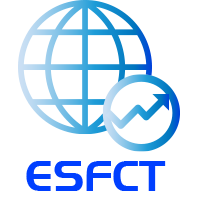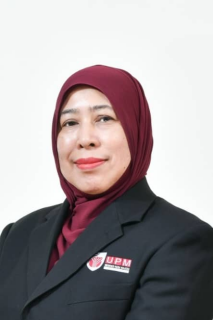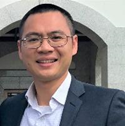
Prof. Normaz Wana Ismail Universiti Putra Malaysia, Malaysia | Research Area: ASEAN studies, particularly issues related to intra regional trade, foreign direct investment, convergence and economic growth Brief: Normaz Wana Ismail is a professor of economics at the School of Business and Economics, Universiti Putra Malaysia. She is also the Deputy Dean of Research and Innovation. She was the Deputy Director of the Institute of Agricultural and Food Policy Studies, Universiti Putra Malaysia. She received her PhD in Economics from the University of Southampton, United Kingdom. Her research interests focus on International Trade and Development Economics including medical trade, high technology trade, digital technology, and economic growth. A recent article entitled “Comparative Advantage and Competitiveness of COVID-19-Related Medical Products Exporters " was published in the Journal of Competitiveness, JCR Q1 JCR. She is vice president of the Southeast Asia International Trade and Finance Association (SEITFA). She also served as a consultant to government agencies such as the Ministry of Health (nutrition department), Economic Planning Unit and Ministry of Domestic Trade, Co-operatives, and Consumerism (KPDNKK), Malaysia Productivity Corporation (MPC). At the International level, she is also involved in consultation work with the Asian Development Bank Institute (ADBI) and the Economic Research Institute for ASEAN and East Asia (ERIA). Title: The Role of Innovation in Medical Products Trade Abstract: Since the outbreak of the COVID-19 pandemic, the global supply of medical products has increased tremendously. The total trade of medical goods was valued at USD 1,286 billion in 2021, compared to USD 932 billion in 2018. The production of items such as face masks, rubber gloves, syringes, and needles, as well as medicines and vaccines, has enabled producer countries to meet the growing global demand. For example, Malaysia has been the largest supplier of rubber gloves, accounting for 54% of the global market. During the pandemic, some producer countries implemented export restrictions to prioritize local needs. A shortage of supply will cause prices to skyrocket and jeopardize the country's health. The objective of this study is to investigate the role of innovation in medical trade products among the 25 major medical goods-exporting countries, which together account for at least 80 percent of the global medical goods trade, over the period from 2014 to 2021. Medical products related to COVID-19 are considered high-technology products. Therefore, R&D expenditure should play a significant role in explaining a country's export of medical products. The findings of the study support the hypothesis that increased investment in innovation by countries leads to higher production and, consequently, greater trade in medical products. |
Assoc. Prof. Hung Do School of Economics and Finance, Massey University, New Zealand | Research Area: Empirical Finance, Banking, Energy Economics, Credit risk, Econometrics Brief: Hung is currently an Associate Professor in Finance and Director of the Master of Finance program at Massey Business School (MBS). He is a member of the MBS Assurance of Learning committee and was also a member of the MBS board between 2019 and 2020. He joined Massey in May 2017 as a Senior Lecturer in Finance/Banking. Prior to this, he had worked for major banks in Australia including Westpac and Commonwealth Bank of Australia. On the academic side, he had worked as a Lecturer at the School of Business, Monash University Malaysia, and a Postdoctoral Research Associate at the University of Technology, Sydney. He obtained a Ph.D. in Financial Econometrics (2013) from Monash University Australia. Hung has taught a wide range of topics including Advanced Risk Analytics, (Advanced) Financial Risk Management, (Advanced) Business Finance, Financial Modelling, Commercial Bank Management, Investment Banking, Financial Econometrics, Quantitative Methods for Financial Markets, and Applied Time Series Econometrics. His teaching quality has been demonstrated by consistently high evaluation scores (normally 90-95%) and nominations for the Lecturer of the Year Award. Hung is specialized in Econometrics and Statistical analysis for Banking & Finance and his research interests are in Banking, Credit Risk, Empirical Finance, Energy Economics, and Time-series econometrics. His research has been published in highly ranked international refereed journals including European Journal of Operational Research, Energy Economics, Journal of Financial Markets, International Review of Financial Analysis, Journal of Real Estate Finance and Economics, Economics Letters, and International Review of Economic and Finance among others. Title of Keynote Speech: Satellite-Driven Investor Attention and Stock Return Comovement Abstract: Satellite launches distract investors from the stock market. Under limited attentional resources, investors allocate their attention more to market-level shocks than firm-specific shocks, making stock returns to comove more with the market on satellite launch days compared to other days. We provide supportive evidence using U.S. satellite launches and return comovements for U.S. stocks. We also show that investors pay more attention to pioneering, failed, and manned launches, leading to larger increases in return comovement. Moreover, international aerospace competition seems to attract more U.S. investors’ attention, especially during the Soviet period and for launches by Russia, China, and India, leading to higher return comovement. Our results are robust to the exclusion of firms in the aerospace industry. Finally, we design a simple strategy to exploit the potential satellite-induced mispricing, which yields an abnormal return of up to around 17% per year within the three-day window around the launch date. |
Assoc. Prof. Claudia Sandei School of Law, University of Padova, Italy | Research Area: Fintech, Information Technology Law, Intellectual Property Law Brief: Claudia Sandei is Associate Professor of Company Law at the School of Law of the University of Padova, Professor of Eu financial regulation and Technology at the University of Hong Kong, Director of Innovation and Technology Law Lab (ITLL), Co-founder and Managing Director of the Digital Law Network (DNL). Qualified Lawyer since 2008, after graduating in Law in Padova in 2003, Prof. Sandei got a Ph.D. at the University of Ferrara in 2009. Besides IT Law, her main areas of legal expertise include Corporate/Financial Law and IP Law. Author of two books on the impact of Technology on Corporate Governance in listed companies and of many articles on financial law in 2020 she has also acted as coeditor of a research book on The Law of Fintech (2020). Lecturer in many foreign Universities (Hannover, Varsavia, Budapest, Leeds, Nottingham, Barcelona, etc.), Member of the Faculty of the PhD Programme in Private Law (Padova University) and in Corporate Law and Professor of EU Company Law at UACS (Skopie, MK). Member of the editorial board of some of the most important Law Journals in Italy, Prof. Sandei has been in the Panel of the 2018 ELI Conference (Digital Law SIG) as one of the most renowned experts of Fintech in Italy and in 2021 in the Annual Conference of ELI (Panel devoted to smart contract). In 2020 she has also been appointed member of the Expert Panel of the European Blockchain Observatory and Forum. Speaker at the UN Internet Governance Forum (IGF 2021-#111); TEDx Speaker. Member of the Human Inspired Technology Research Centre (HIT, Padova University). Title of Keynote Speech: FINTECH and ESG: a European Perspective Abstract: The financial services industry is currently undergoing a major transformation, with digitization and sustainability being the core drivers. As stated by President Von der Leyen, the twin transition is a key priority and a cornerstone of the European Commission agenda. Through the analisys of the most relevant policy initiatives, the speech aims to identify weaknesses and strenghts the EU strategy seems to suffer from. |
Assoc. Prof. Chan Sok Gee Institute of China Studies, Faculty of Arts and Social Sciences, University of Malaya, Malaysia | Research Area: INTERNATIONAL ECONOMICS (Foreign Direct Investment), BANKING (Banking efficiency, stock market performance) Brief: Dr Chan Sok Gee is an associate professor in the Institute of China Studies, University of Malaya. She obtained her PhD degree in Economics from the Northern University of Malaya with specialization in Banking and Financial Economics. She specialized in research on bank efficiency, government efficiency and country efficiency analysis. Currently, she is the top 20% economic researcher in Malaysia and top 30% in Asia according to the IDEAS Economic Ranking. Currently, her research focus is on the impact of China investment to the world economy. Title of Keynote Speech: Country-of-Origin Effects on Technology Transfer in Foreign Direct Investment Abstract: This study investigates the role of foreign direct investment (FDI) and its country-of-origin in technology transfer especially on the world top five investors, namely the United States, Germany, Japan, China, and the United Kingdom. Using data of 95 countries from 2008 to 2019, results indicate that net inflows of the FDI is positively related to technological transfer especially in developing countries. This is consistent with the findings that fewer resources endowed countries benefited from advanced technologies and management know-how of the FDI. Furthermore, results suggest different country-of-origin affects the technology transfer of the host economy differently. These results are consistent with studies that suggest the FDI origins are crucial to expose the firms with variety of technologies and management practices. Results from quantile analysis prove that there is an existence of a threshold for the developed and developing countries to gain from the country-of-origin of the FDI. Therefore, there is a need to relook at the investment policies of the host countries to maximize the benefits from different sources of FDI. Keywords: Foreign Direct Investment; Country-of-Origin; Technology Transfer; Generalized Method of Moments; Quantile Analysis |



